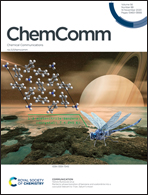Profiling of post-translational modifications by chemical and computational proteomics
Abstract
Post-translational modifications (PTMs) diversify the molecular structures of proteins and play essential roles in regulating their functions. Abnormal PTM status has been linked to a variety of developmental disorders and human diseases, highlighting the importance of studying PTMs in understanding physiological processes and discovering novel nodes and links with therapeutic intervention potential. Classical biochemical methods are suitable for studying PTMs on individual proteins; however, global profiling of PTMs in proteomes remains a challenging task. In this feature article, we start with a brief review of the traditional affinity-based strategies and shift the emphasis to summarizing recent progress in the development and application of chemical and computational proteomic strategies to delineate the global landscapes of functional PTMs. Finally, we discuss current challenges in PTM detection and provide future perspectives on how the field can be further advanced.



 Please wait while we load your content...
Please wait while we load your content...